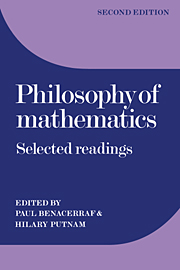Book contents
- Frontmatter
- Contents
- Preface to the second edition
- Introduction
- Part I The foundations of mathematics
- Part II The existence of mathematical objects
- Part III Mathematical truth
- Part IV The concept of set
- Russell's mathematical logic
- What is Cantor's continuum problem?
- The iterative concept of set
- What is the iterative conception of set?
- The concept of set
- Bibliography
What is the iterative conception of set?
Published online by Cambridge University Press: 05 June 2012
- Frontmatter
- Contents
- Preface to the second edition
- Introduction
- Part I The foundations of mathematics
- Part II The existence of mathematical objects
- Part III Mathematical truth
- Part IV The concept of set
- Russell's mathematical logic
- What is Cantor's continuum problem?
- The iterative concept of set
- What is the iterative conception of set?
- The concept of set
- Bibliography
Summary
I intend to raise here some questions about what is nowadays called the ‘iterative conception of set’. Examination of the literature will show that it is not so clear as it should be what this conception is.
Some expositions of the iterative conception rest on a ‘genetic’ or ‘constructive’ conception of the existence of sets. An example is the subtle and interesting treatment of Professor Wang. This conception is more metaphysical, and in particular more idealistic, than I would expect most set theorists to be comfortable with. In my discussion I shall raise some difficulties for it.
In the last part of the paper I introduce an alternative based on some hints of Cantor and on the Russellian idea of typical ambiguity. This is not less metaphysical though it is intended to be less idealistic. I see no way to obtain philosophical understanding of set theory while avoiding metaphysics; the only alternative I can see is a positivistic conception of set theory. Perhaps the latter would attract some who agree with the critical part of my argument.
However, the positive part of the paper will concentrate on the notion of proper class and the meaning of unrestricted quantifiers in set theory. That these issues are closely related is evident since in Zermelo-type set theories the universe is a proper class.
The concept of set is also intimately related to that of ordinal.
- Type
- Chapter
- Information
- Philosophy of MathematicsSelected Readings, pp. 503 - 529Publisher: Cambridge University PressPrint publication year: 1984
- 4
- Cited by



